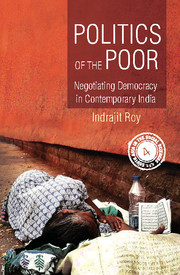Book contents
- Frontmatter
- Contents
- List of Tables, Map and Charts
- Acknowledgements
- Glossary
- Acronyms
- Introduction: Against False Binaries
- 1 The Perspectives of the Study: Towards an Agonistics of Democracy
- 2 Political Spaces: Institutional Opportunity Structures
- 3 Political Spaces: Social Relations of Power
- 4 From Clientelism to Citizenship?: The Politics of Supplications
- 5 From Moral Vocabularies to Languages of Stateness?: The Politics of Demands
- 6 From Backwardness to Improvement?: The Politics of Disputation
- 7 From Tradition to Modernity?: The Politics of Imagination
- Conclusion: The Politics of the Poor: Agonistic Negotiations with Democracy
- Annexure 1 The Dramatis Personae, 2009–10
- Annexure 2 The Census Survey
- Annexure 3 The Multidimensional Poverty Index
- Annexure 4 Schedule for BPL Census 2002
- Annexure 5 Schedule for BPL Census 2002 West Bengal
- Annexure 6 BPL Cutoff List for West Bengal
- Bibliography
- Index
5 - From Moral Vocabularies to Languages of Stateness?: The Politics of Demands
Published online by Cambridge University Press: 03 August 2019
- Frontmatter
- Contents
- List of Tables, Map and Charts
- Acknowledgements
- Glossary
- Acronyms
- Introduction: Against False Binaries
- 1 The Perspectives of the Study: Towards an Agonistics of Democracy
- 2 Political Spaces: Institutional Opportunity Structures
- 3 Political Spaces: Social Relations of Power
- 4 From Clientelism to Citizenship?: The Politics of Supplications
- 5 From Moral Vocabularies to Languages of Stateness?: The Politics of Demands
- 6 From Backwardness to Improvement?: The Politics of Disputation
- 7 From Tradition to Modernity?: The Politics of Imagination
- Conclusion: The Politics of the Poor: Agonistic Negotiations with Democracy
- Annexure 1 The Dramatis Personae, 2009–10
- Annexure 2 The Census Survey
- Annexure 3 The Multidimensional Poverty Index
- Annexure 4 Schedule for BPL Census 2002
- Annexure 5 Schedule for BPL Census 2002 West Bengal
- Annexure 6 BPL Cutoff List for West Bengal
- Bibliography
- Index
Summary
We worked on the Ek Sho Deener Kaaj [100 days work scheme, a colloquial reference to NREGA] so that our children and grandchildren would never have to work on something like that. Ever.
Majhuli Moholi, 28 February 2010, Ditya, 30, landless labourerDemocracies provide certain opportunity structures for populations within their jurisdictions to press for their claims. India's democracy, riven though it is with widening inequalities, provides quite specific political spaces for the poor to advance their demands. In the previous chapter, I noted the ways in which they negotiate with politicians and political mediators over the implementation of a narrowly-targeted social policy. In this chapter, I explore their negotiations in the context of a more broad-based social policy, one into which participants self-select themselves. Does the expansion of generalized social policy eliminate poor people's negotiations with elected representatives, other politicians and political mediators? In this chapter, I suggest that their negotiations continue despite the introduction of generalized social policy. However, the form of such negotiations is different from the supplications we encountered in the previous chapter, couched as they are in the vocabulary of ‘demands’. The empirical material in this chapter refers to the labouring classes’ demands for work to their elected local governments under the aegis of India's Mahatma Gandhi National Rural Employment Guarantee Act (MGNREGA, or NREGA for a shorter acronym). The stipulations of the MGNREGA entitle any member of India's rural household to apply for unskilled manual work. Such work is to be remunerated at prevailing wage rates, subject to a maximum of 100 days of work per household. The state is mandated by law to provide such work. In the event of failure, the state must pay applicants an unemployment allowance. In fact, applications for work scarcely result in the provision of work. Nevertheless, believing the programme to be useful to them, while also taking care not to antagonize influential people in their locality, applicants undertake a plethora of strategies to advance their points of view.
How are we to understand people's demands for work in the light of our concerns about the meanings people make of democracy? Do their demands appropriate the juridical vocabularies of the state, signalling their incorporation as the subject of rights?
- Type
- Chapter
- Information
- Politics of the PoorNegotiating Democracy in Contemporary India, pp. 238 - 291Publisher: Cambridge University PressPrint publication year: 2017



